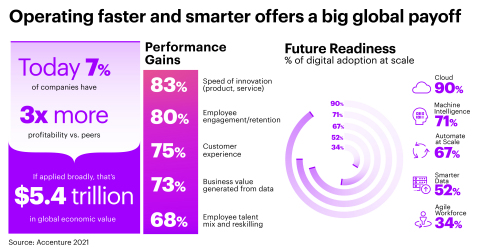“Future-Ready” Organizations Leveraging Digital to Operate Faster and Smarter Could Help Unlock $5 Trillion in Economic Growth, Says Accenture Study
Accenture's recent report highlights that companies embracing digital transformation can unlock $5.4 trillion in growth. The study surveyed 1,100 executives, revealing that only 7% of companies achieve significant efficiency and profitability gains. Key findings indicate that future-ready companies leverage AI, cloud, and data analytics for competitive advantage, achieving average efficiency gains of 13.1% and profitability increases of 6.4%. Industries like automotive, insurance, and banking are expected to lead in future readiness as digital acceleration progresses.
- Future-ready organizations achieve average efficiency gains of 13.1% and lift profitability by 6.4%.
- 90% of future-ready organizations utilize cloud infrastructure at scale.
- 71% of future-ready organizations have fully adopted AI and data science capabilities.
- 67% of future-ready organizations have adopted end-to-end digital processes.
- 93% of organizations still have room for improvement in business operations maturity.
Insights
Analyzing...
The pandemic-driven acceleration of digital adoption and the resulting new agile ways of operating could unlock

Operating faster and smarter offers a big global payoff.
Accenture’s findings indicate that even amid the current economic uncertainty, a small core of companies — about
Based on a global survey of 1,100 senior-level executives and externally validated financial data, the report, “Fast Track to Future-Ready Performance,” assessed the impact of achieving progressive levels of business operations maturity with the highest level being “future-ready.” The higher the maturity, the greater the degree of digital capabilities, such as artificial intelligence (AI), cloud, and data analytics.
“Uncertainty has also put a premium on new, agile ways of doing things, reinforcing the idea that operations can be a catalyst for competitive advantage, transformational value and growth,” said Manish Sharma, group chief executive of Accenture Operations. “But this only works if companies think big — transforming how the work actually gets done across technology, processes and people.”
Achieving Future Readiness
Future-ready enterprises transform how work gets done by using rich data for decision-making, augmenting people with artificial intelligence (AI) and employing agile workforce models — with striking differences in digital adoption and operational maturity. The areas they focus on include:
-
Cloud: Nine in 10 future-ready organizations (
90% ) — versus76% of other organizations — use cloud infrastructure at scale, and78% are also exploring new areas to scale and maximize value. -
Machine Intelligence: With a focus on augmenting people with technology,
71% of future-ready organizations have fully adopted AI and data science capabilities — an 18-fold increase from just4% three years ago — and38% now scale AI practices, compared with just3% of other organizations. That number is growing, with63% of future-ready organizations expected to scale AI practices by 2023. -
Automate at Scale: Two-thirds (
67% ) of future-ready organizations have adopted end-to-end digital processes and58% continue to scale leading practices, compared with32% and6% , respectively, of other organizations. Four-fifths (82% ) are expected to scale leading practices by 2023. -
Smarter Data: Future-ready organizations are more than 10 times as likely as other organizations (
52% vs.5% ) to use analytics at scale — paired with better, more diverse data sets (45% vs.6% ) — to generate actionable insights and inform decision-making. Three-fourths (75% ) are expected to use analytics with diverse data by 2023. -
Agile Workforce: One-third (
34% ) of future-ready organizations have adopted an agile workforce strategy at scale, compared with just4% of other organizations, enabling them to tap into an expanded talent pool among ecosystem partners to mobilize special talent as needed. Accenture estimates71% will adopt an agile workforce strategy by 2023.
“Future-ready organizations know that it’s about maximizing talent in an era when people are critical to success,” Sharma said. “They’re harnessing change by retooling operating models in ways that capitalize on human ingenuity and machine intelligence to transform the way people work and the business performs.”
Organizations are currently on different levels of operations maturity in all industries. The findings indicate the percentage of future-ready organizations in insurance (
By assessing what Accenture calls “transformational value” — a concept that factors in financial performance and the differentiated experience delivered — the research found future-ready organizations achieve average efficiency gains of
Additionally, organizations that advanced to the ‘future-ready’ level in the past three years reported improvements in the speed of product and services innovation (cited by
While the majority are making progress, Accenture’s findings report
The report, “Fast-Track to Future-Ready Performance,” is the first in a research series that looks at the drivers and trends shaping how enterprises and business functions operate globally.
Methodology
Accenture surveyed 1,100 senior-level executives worldwide,
About Accenture
Accenture is a global professional services company with leading capabilities in digital, cloud and security. Combining unmatched experience and specialized skills across more than 40 industries, we offer Strategy and Consulting, Interactive, Technology and Operations services—all powered by the world’s largest network of Advanced Technology and Intelligent Operations centers. Our 514,000 people deliver on the promise of technology and human ingenuity every day, serving clients in more than 120 countries. We embrace the power of change to create value and shared success for our clients, people, shareholders, partners and communities. Visit www.accenture.com.
View source version on businesswire.com: https://www.businesswire.com/news/home/20210127005139/en/







